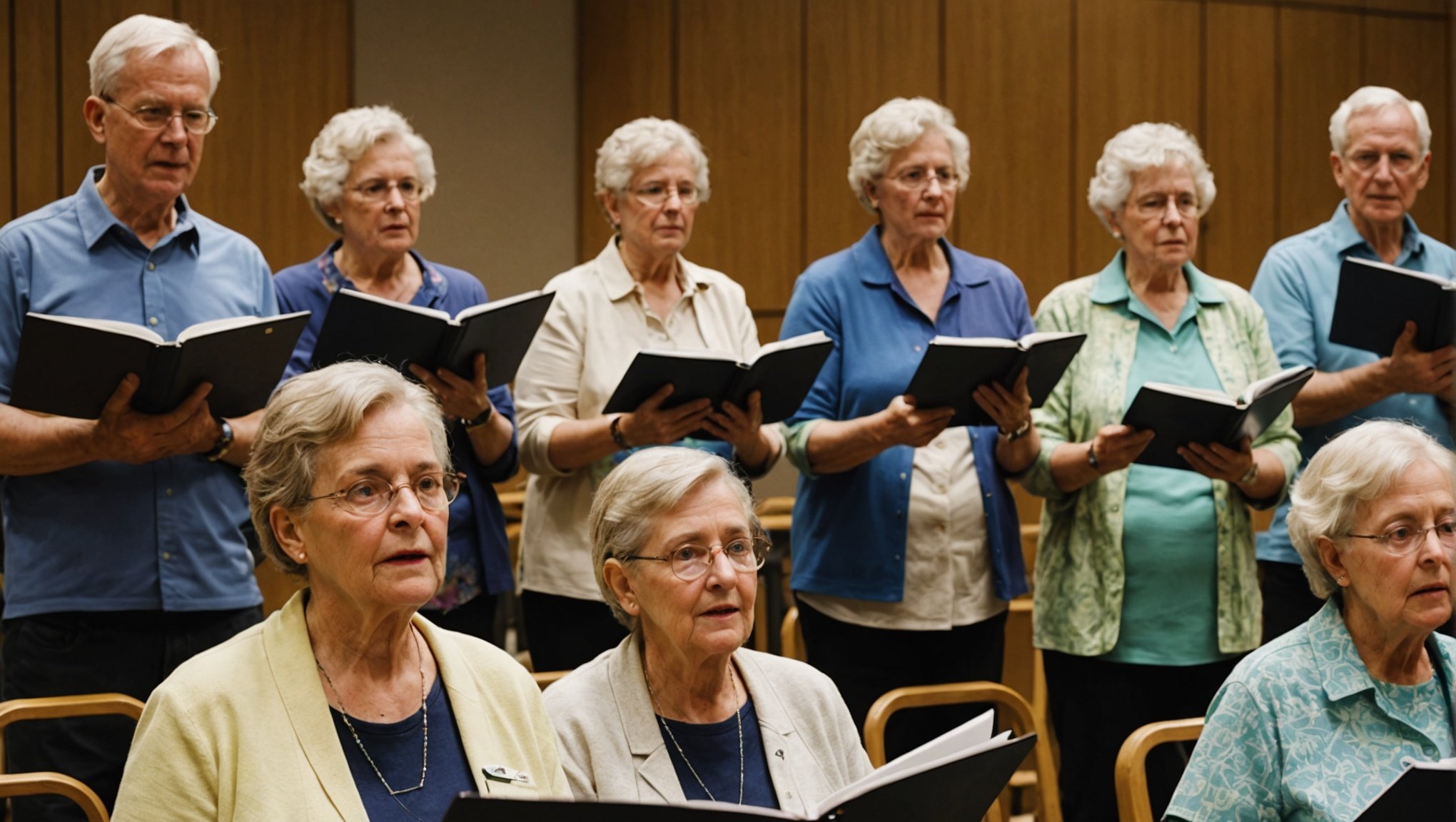Seniors often face challenges to both physical and social well-being as they age. Engaging in choir participation presents a unique solution, combining musical expression with health benefits. Regular singing enhances lung capacity and overall respiratory health while fostering connection and community among participants. This dual impact supports not only physical vitality but also improves social bonds, addressing feelings of loneliness. Discover how joining a choir can enrich the lives of seniors in meaningful and practical ways.
The Health Benefits of Choir Participation for Seniors
Engaging in choir participation offers numerous health benefits for seniors, particularly in terms of respiratory health. Singing has been linked to improvements in lung capacity, which is crucial for maintaining overall well-being and vitality in older adults.
Also read : Top Strategies for UK Seniors to Tackle Seasonal Hay Fever Effectively
Research findings consistently highlight that singing in a choir can enhance lung function. This is largely due to the deep breathing techniques and sustained vocal exercises involved in singing, which help to expand the lungs and improve their efficiency. As a result, seniors who participate in choirs often experience better respiratory health, which can lead to improved endurance and energy levels in their daily lives.
Moreover, there is a strong correlation between choir participation and physical health improvements beyond just lung capacity. The act of singing requires physical exertion, which can contribute to better cardiovascular health and increased oxygenation throughout the body. This holistic benefit underscores why choir participation is not only an enjoyable activity but also a valuable one for seniors seeking to enhance their physical health.
Topic to read : Unlocking Restful Nights: The Impact of Mindful Breathing on Sleep Quality for Seniors Struggling with Insomnia
In summary, choir participation offers tangible benefits for seniors, particularly in improving lung capacity and overall physical health. Engaging in this activity can lead to a healthier, more fulfilling lifestyle.
Emotional and Psychological Benefits of Singing
Participating in a choir offers profound emotional well-being benefits for seniors. Group singing has a significant psychological impact, fostering a sense of belonging and community. Many seniors report feeling more connected and less isolated when they engage in choir activities. This connection can be crucial for mental health, as loneliness is a common issue among older adults.
Singing serves as a powerful form of emotional expression, allowing individuals to convey feelings and experiences through music. This expressive outlet can lead to reduced stress and anxiety, further enhancing emotional well-being. Engaging in choir participation provides a safe space for seniors to explore their emotions and share them with others.
Numerous testimonials from seniors highlight the positive impact choir participation has on their lives. Many express a renewed sense of purpose and joy, attributing these feelings to the camaraderie and shared experiences within the choir. These personal accounts underscore the transformative power of group singing on emotional health.
Overall, the psychological impact of singing in a choir extends beyond the music itself, offering seniors an opportunity to improve their emotional well-being and enrich their lives through shared musical experiences.
Social Engagement Through Choir Activities
Engaging in choir activities significantly enhances social wellness for seniors. The importance of maintaining social connections cannot be overstated, especially as individuals age. Choir participation offers a structured opportunity for seniors to engage with others, fostering friendships and strengthening community ties.
Singing in a choir naturally encourages interaction and collaboration, which are key components of building a supportive social network. This environment allows seniors to develop new relationships and deepen existing ones, contributing to a sense of belonging. The shared goal of creating music together creates a unique bond that can be both fulfilling and enduring.
Moreover, choir participation has a profound impact on reducing loneliness and isolation, common challenges faced by older adults. Regular choir meetings provide a consistent social outlet, helping seniors feel more connected and less isolated. This sense of community is not only emotionally rewarding but also beneficial for mental health, as social engagement is linked to improved cognitive function and overall well-being.
In essence, choir activities offer seniors more than just a musical experience; they provide a platform for meaningful social engagement, enriching their lives through community involvement and interpersonal connections.
Research on Singing and Brain Health
Engaging in singing activities can have profound cognitive benefits for seniors. Numerous studies have established a connection between singing and enhanced brain health. Singing, especially in a group setting like a choir, stimulates various parts of the brain, which can lead to improved cognitive function. This is crucial for seniors who may be experiencing age-related cognitive decline.
One of the key benefits of singing is its positive effect on memory retention. Music and singing involve complex cognitive processes that require memory recall, pattern recognition, and emotional engagement. These activities can help to strengthen neural connections, making it easier for seniors to retain and recall information.
Moreover, singing has been shown to play a significant role in preventing cognitive decline. Regular engagement in musical activities can slow down the progression of conditions like dementia and Alzheimer's disease. The mental exercise involved in singing helps to keep the brain active and engaged, which is essential for maintaining cognitive health in older adults.
In summary, the cognitive benefits of singing extend beyond the joy of music. It offers a valuable tool for promoting brain health and supporting memory retention, making it an essential activity for seniors.
Practical Tips for Joining a Choir
Joining a choir can be a rewarding experience for seniors, offering both social and health benefits. Finding local choirs suitable for seniors is the first step. Community centres, senior centres, and local churches often host choirs that welcome older adults. Checking bulletin boards or online community groups can also help identify opportunities.
For those feeling hesitant about joining, it’s important to remember that many choirs are inclusive and supportive. Overcoming initial hesitations can be achieved by attending a rehearsal as a guest. This allows potential members to gauge the atmosphere and determine if it feels welcoming. Speaking to current choir members can also provide insights and reassurance.
The importance of a welcoming choir environment cannot be overstated. A supportive atmosphere encourages participation and fosters a sense of belonging. Look for choirs that promote inclusivity, have a friendly conductor, and offer a range of musical styles to suit diverse tastes.
- Research local options through community resources.
- Attend a trial rehearsal to experience the choir firsthand.
- Engage with choir members to ease any doubts.
By following these practical tips, seniors can find a choir that enhances their life and well-being.
Accessible Choir Programs for Older Adults
Participating in accessible choir programs can be a fulfilling experience for older adults. Many senior-friendly choirs are specifically designed to cater to the needs and preferences of seniors, ensuring a welcoming and inclusive environment. These programs often feature music selections that resonate with older generations, making them more enjoyable and engaging.
For those unable to attend in person, online choir options provide a flexible alternative. Virtual platforms allow seniors to join rehearsals and performances from the comfort of their homes. This remote participation can be particularly beneficial for individuals with mobility challenges or those living in remote areas. Online choirs often use video conferencing tools, making it easy to connect with fellow singers and instructors.
Community resources play a vital role in facilitating choir participation for seniors. Many local senior centres and community organisations offer information and support for starting or joining choirs. These resources can help seniors find choirs that match their interests and abilities, ensuring a rewarding experience.
- Explore online platforms for remote choir participation.
- Utilise local community resources to find suitable choir programs.
- Look for senior-friendly choirs that offer a supportive environment.
By exploring these options, seniors can enjoy the benefits of choir participation regardless of their circumstances.
The Role of Choir Leaders in Enhancing Participation
Choir leadership plays a pivotal role in fostering an inclusive and engaging environment for seniors. Effective choir leaders are not just conductors; they are motivators and facilitators who understand the unique needs of older adults. By employing tailored engagement strategies, they can significantly enhance participation and enjoyment in choir activities.
A supportive choir leader recognises the importance of creating a welcoming atmosphere. This involves being patient and encouraging, especially when seniors are hesitant or nervous. Techniques such as positive reinforcement and personalised feedback can boost confidence and motivate seniors to participate actively.
Adapting to varying skill levels and health conditions is crucial. Choir leaders can implement modifications, like slower-paced rehearsals or simplified musical arrangements, to accommodate different abilities. This inclusivity ensures that all members feel valued and capable, regardless of their experience or physical limitations.
Furthermore, leaders can introduce engagement strategies that make rehearsals more enjoyable, such as themed sessions or incorporating familiar songs that resonate with the group. These strategies not only enhance musical skills but also strengthen community bonds and overall satisfaction.
In essence, effective choir leadership is about balancing musical excellence with empathy and adaptability, ensuring every senior finds joy and fulfilment in the choir.
Health Outcomes Linked to Regular Singing
Engaging in regular singing activities has been linked to a variety of health outcomes that contribute to overall wellness. Seniors who frequently participate in singing, whether in a choir or solo, often experience long-term benefits that enhance their quality of life.
One of the most significant health outcomes is the improvement in respiratory health. Studies have shown that the deep breathing techniques used in singing can lead to better lung function and increased lung capacity. This is particularly beneficial for seniors, as it can improve endurance and energy levels, making daily activities more manageable.
Additionally, regular singing has been associated with positive mental health outcomes. It provides an emotional outlet and can reduce stress and anxiety, which are common among older adults. The sense of achievement and joy from singing can also boost self-esteem and overall mood.
Research consistently highlights that seniors who engage in regular singing activities enjoy both physical and mental health improvements. These benefits underscore the importance of incorporating singing into daily routines as a holistic approach to wellness. By participating in singing, seniors can experience enhanced health outcomes that contribute to a more fulfilling lifestyle.
Case Studies of Successful Choirs for Seniors
Exploring success stories of senior choirs reveals the profound impact of choir participation on older adults. One notable example is the Silver Song Club in the UK, which has been instrumental in transforming the lives of its members. This choir focuses on inclusivity, allowing seniors of all abilities to participate and enjoy the benefits of singing. Participants have reported improved mental health and a greater sense of community, illustrating the power of music to foster connections.
Another case study is the Young@Heart Chorus based in Massachusetts, USA. This choir has gained international recognition, showcasing that age is no barrier to musical achievement. Members have shared stories of regained confidence and vitality, attributing these changes to their involvement in the choir. The group's success underscores the importance of adapting music selections to resonate with seniors, enhancing engagement and enjoyment.
Lessons learned from these established programs highlight the need for supportive leadership and a welcoming environment. Emphasising diverse musical styles and encouraging personal expression are key strategies that contribute to the success of senior choirs. These examples serve as inspiration for new programs aiming to replicate the positive outcomes seen in these thriving communities.
Future Trends in Choir Participation for Seniors
Exploring the future of choir programs for seniors reveals exciting possibilities driven by emerging trends and technological advancements. As the landscape of community singing evolves, several key developments are shaping the future of choir participation for older adults.
One significant trend is the increasing integration of technology to enhance choir experiences. Virtual choirs and digital platforms are becoming more prevalent, allowing seniors to participate in singing activities regardless of geographical limitations. This trend not only broadens access but also introduces new features like virtual reality, which can simulate in-person rehearsals and performances, enriching the overall experience.
Furthermore, the future of choir programs is likely to see a greater emphasis on inclusivity and diversity in music selection. Choirs are expected to incorporate a wider range of musical genres and cultural influences, reflecting the diverse backgrounds and interests of their members. This shift aims to attract more participants and foster a deeper connection to the music.
Predictions for the future of singing as a community activity among seniors also highlight the potential for intergenerational choirs. These programs bring together different age groups, promoting mutual understanding and collaboration through shared musical experiences. As these trends continue to develop, the future of choir participation for seniors looks promising and vibrant.











